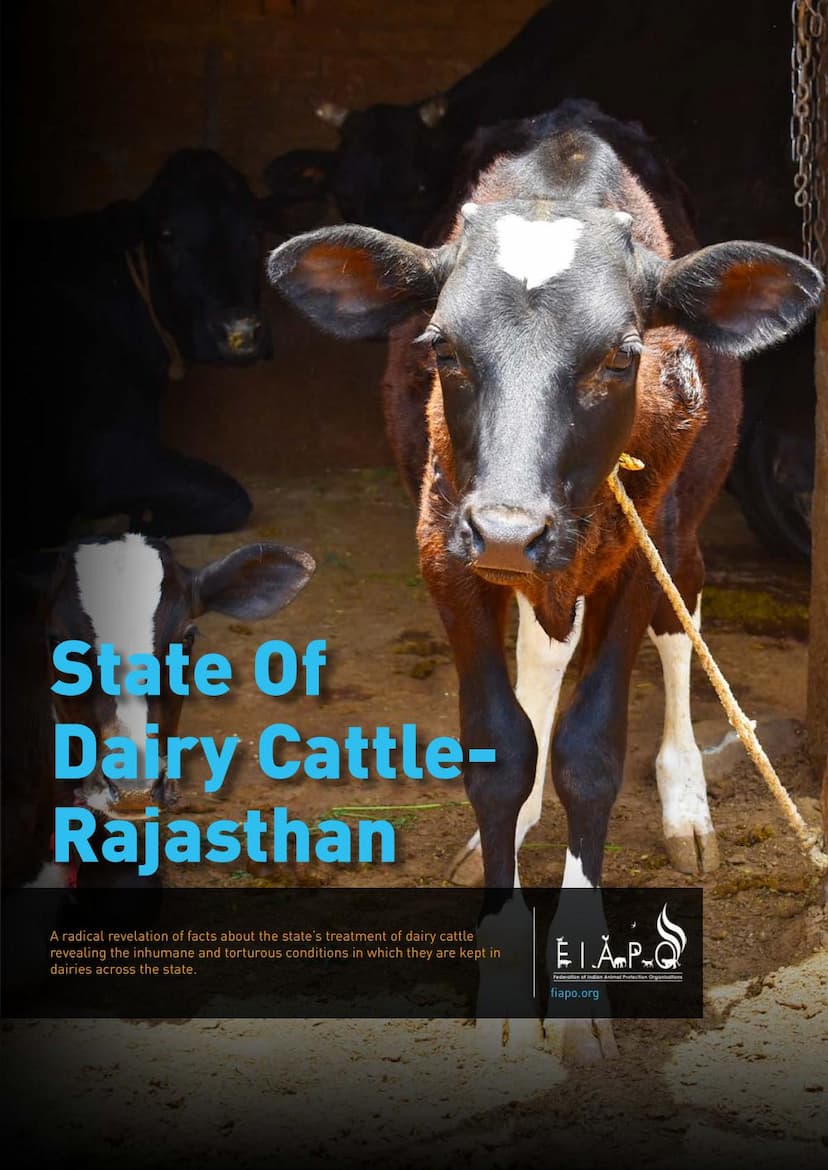State Of Dairy Cattle Rajasthan Report
Added to library: September 2, 2025

Summary
This report, "State of Dairy Cattle Rajasthan," published by the Federation of Indian Animal Protection Organisations (FIAPO), reveals widespread and severe instances of inhumane and torturous conditions faced by dairy cattle across Rajasthan, India.
The investigation, conducted across 49 dairies in four cities (Alwar, Bikaner, Jaipur, and Jodhpur), highlights a stark contrast between the increasing demand for milk and the abysmal welfare standards for the animals producing it. Rajasthan's milk production has seen a significant rise, prompting a shift towards more intensive dairy farming practices.
Key findings of the investigation include:
-
Deplorable Housing:
- Flooring: A significant majority of dairies (over 51%) have floors made of cement and brick, with many more having cement or brick floors. These hard, often slippery surfaces, frequently covered in excreta, lead to wounds, infections, and fractures.
- Tethering: Cattle, including calves, are predominantly kept tied on short leashes for extended periods, severely restricting their movement. Only a small percentage (12.77%) allow animals to roam freely within the dairy premises.
- Overcrowding: Cattle are housed in small, poorly ventilated, and dark enclosures with inadequate space for movement, often leading to injuries from slipping in their own waste.
-
Inadequate Food and Water:
- Fodder provided is often unhygienic, insufficient, and of poor nutritional value, consisting mainly of dry straw.
- Mangers are frequently empty or contaminated, sometimes with sharp objects. Water is not always replaced and can be dirty.
-
Cruel Breeding and Milking Practices:
- Banned Hormones: The indiscriminate use of banned hormones like Oxytocin to artificially increase milk production is rampant, leading to severe health issues and reduced lifespans for the cattle.
- Painful Milking: Painful methods of milk extraction are used, causing infections and wounds to the udder and teats.
- Unhygienic Milking: Milking often occurs in unhygienic conditions, with milk being extracted from infected cows (e.g., with Mastitis).
- Unskilled Labor: Unskilled labor often resorts to cruel practices in managing the dairies.
-
Lack of Veterinary Care:
- Veterinary assistance is irregular, with owners only consulting vets for vaccinations annually or when an animal is already sick.
- Visible wounds and infections are often left untreated.
-
Mishandling of Calves and Old Cattle:
- Male Calves: Male calves are considered "useless byproducts" and are often sold for slaughter (illegally, as they are too young), neglected to the point of death, or abandoned on roadsides.
- Old Cattle: Cows that no longer produce sufficient milk are either sold at low prices to slaughterhouses or abandoned on the streets.
- Separation: Calves are separated from their mothers and denied the chance for maternal contact, including nasal and visual contact.
-
Non-Compliance with Laws:
- None of the dairies investigated were registered with local authorities as required by law.
- Practices violate numerous animal protection laws, including the Prevention of Cruelty to Animals Act, the Slaughter House Rules, and the Transport of Animals Rules.
-
Food Safety Concerns:
- The unhygienic conditions and the use of hormones and oils in milking can lead to milk contamination, posing a risk to human health as the milk is often sold directly to consumers without pasteurization.
The report's urgent demands include:
- Action Against Violators: Strict enforcement of existing laws against dairies violating regulations.
- Immediate Relief:
- Enforcement of a complete ban on the use of hormones for increasing milk production.
- Provision of adequate space for cattle to move, rest, and exhibit natural behaviors.
- Ensuring proper health maintenance with regular veterinary care and treatment of injuries and infections.
- Provision of clean drinking water, food, and shelter.
- Protection of calves from early-age slaughter.
- Vigilance to ensure hygienic milk supply and a healthy dairy environment.
- Implementation of FIAPO's Dairy Code: Adopting and implementing the FIAPO Dairy Code, which outlines best practices for dairy cattle welfare, to strengthen existing laws or create new regulations.
In conclusion, the report paints a grim picture of the dairy industry in Rajasthan, characterized by systemic cruelty and a blatant disregard for animal welfare laws. It calls for urgent legislative reform and strict enforcement to ensure more humane treatment of dairy cattle.